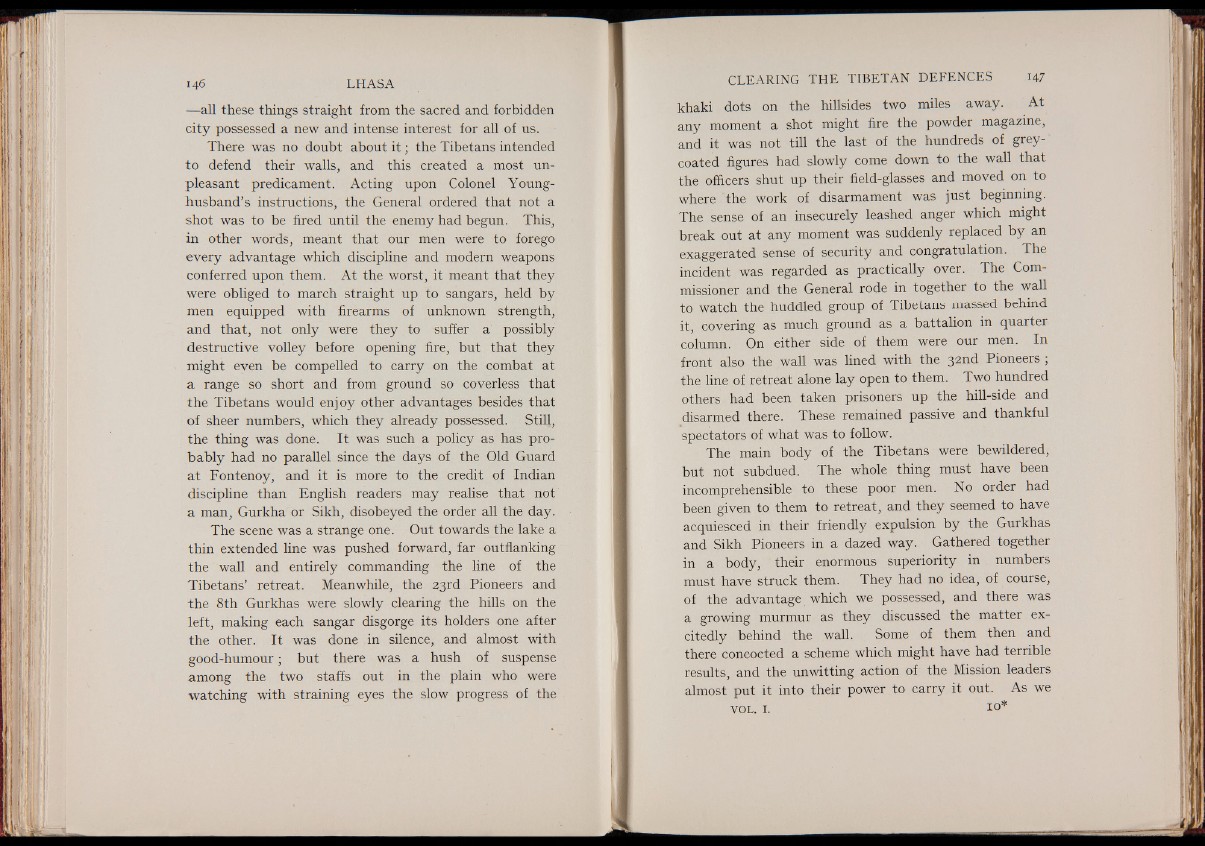
— all these things straight from the sacred and forbidden
city possessed a new and intense interest for all of us.
There was no doubt about i t ; the Tibetans intended
to defend their walls, and this created a most unpleasant
predicament. Acting upon Colonel Young-
husband’s instructions, the General ordered that not a
shot was to be fired until the enemy had begun. This,
in other words, meant that our men were to forego
every advantage which discipline and modern weapons
conferred upon them. At the worst, it meant that they
were obliged to march straight up to sangars, held by
men equipped with firearms of unknown strength,
and that, not only were they to suffer a possibly
destructive volley before opening fire, but that they
might even be compelled to carry on the combat at
a range so short and from ground so coverless that
the Tibetans would enjoy other advantages besides that
of sheer numbers, which they already possessed. Still,
the thing was done. It was such a policy as has probably
had no parallel since the days of the Old Guard
at Fontenoy, and it is more to the credit of Indian
discipline than English readers may realise that not
a man, Gurkha or Sikh, disobeyed the order all the day.
The scene was a strange one. Out towards the lake a
thin extended line was pushed forward, far outflanking
the wall and entirely commanding the line of the
Tibetans’ retreat. Meanwhile, the 23rd Pioneers and
the 8th Gurkhas were slowly clearing the hills on the
left, making each sangar disgorge its holders one after
the other. It was done in silence, and almost with
good-humour; but there was a hush of suspense
among the two staffs out in the plain who were
watching with straining eyes the slow progress of the
khaki dots on the hillsides two miles away. At
any moment a shot might fire the powder magazine,
and it was not till the last of the hundreds of grey--
coated figures had slowly come down to the wall that
the officers shut up their field-glasses and moved on to
where the work of disarmament was just beginning.
The sense of an insecurely leashed anger which might
break out at any moment was suddenly replaced by an
exaggerated sense of security and congratulation. The
incident was regarded as practically over. The Commissioner
and the General rode in together to the wall
to watch the huddled group of Tibetans massed behind
it, covering as much ground as a battalion in quarter
column. On either side of them were our men. In
front also the wall was lined with the 32nd Pioneers ;
the line of retreat alone lay open to.them. Two hundred
others had been taken prisoners up the hill-side and
disarmed there. These remained passive and thankful
spectators of what was to follow.
The main body of the Tibetans were bewildered,
but not subdued. The whole thing must have been
incomprehensible to these poor men. No order had
been given to them to retreat, and they seemed to have
acquiesced in their friendly expulsion by the Gurkhas
and Sikh Pioneers in a dazed way. Gathered together
in a body, their enormous superiority in numbers
must have struck them. They had no idea, of course,
of the advantage which we possessed, and there was
a growing murmur as they discussed the matter excitedly
behind the wall. Some of them then and
there concocted a scheme which might have had terrible
results, and the unwitting action of the Mission leaders
almost put it into their power to carry it out. As we